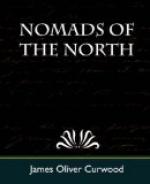He did not return to his windfall. In a little open he sat on his haunches, listening to the night sounds, and watching the stars as they came out. There was an early moon, and as it came up over the forest, a great throbbing red disc that seemed filled with life, he howled mournfully in the face of it. He wandered out into a big burn a little later, and there the night was like day, so clear that his shadow followed him and all other things about him cast shadows, And then, all at once, he caught in the night wind a sound which he had heard many times before.
It came from far away, and it was like a whisper at first, an echo of strange voices riding on the wind, A hundred times he had heard that cry of the wolves. Since Maheegun, the she-wolf, had gashed his shoulder so fiercely away back in the days of his puppyhood he had evaded the path of that cry. He had learned, in a way, to hate it. But he could not wipe out entirely the thrill that came with that call of the blood. And to-night it rode over all his fear and hatred. Out there was company. Whence the cry came the wild brethren were running two by two, and three by three, and there was comradeship. His body quivered. An answering cry rose in his throat, dying away in a whine, and for an hour after that he heard no more of the wolf-cry in the wind. The pack had swung to the west—so far away that their voices were lost. And it passed— with the moon straight over them—close to the shack of Pierrot, the halfbreed.
In Pierrot’s cabin was a white man, on his way to Fort O’ God. He saw that Pierrot crossed himself, and muttered.
“It is the mad pack,” explained Pierrot then. “M’sieu, they have been KESKWAO since the beginning of the new moon. In them are the spirits of devils.”
He opened the cabin door a little, so that the mad cry of the beasts came to them plainly. When he closed it there was in his eyes a look of strange fear.
“Now and then wolves go like that—KESKWAO (stark mad)—in the dead of winter,” he shuddered. “Three days ago there were twenty of them, m’sieu, for I saw them with my own eyes, and counted their tracks in the snow. Since then they been murdered and torn into strings by the others of the pack. Listen to them ravin’! Can you tell me why, m’sieu? Can you tell me why wolves sometimes go mad in the heart of winter when there is no heat or rotten meat to turn them sick? Non? But I can tell you. They are the loups-garous; in their bodies ride the spirits of devils, and there they will ride until the bodies die. For the wolves that go mad in the deep snows always die, m’sieu. That is the strange part of it. They die!”
And then it was, swinging eastward from the cabin of Pierrot, that the mad wolves of Jackson’s Knee came into the country of the big swamp wherein trees bore the Double-X blaze of Jacques Le Beau’s axe. There were fourteen of them running in the moonlight. What it is that now and then drives a wolf-pack mad in the dead of winter no man yet has wholly learned. Possibly it begins with a “bad” wolf; just as a “bad” sledge-dog, nipping and biting his fellows, will spread his distemper among them until the team becomes an ugly, quarrelsome horde. Such a dog the wise driver kills—or turns loose.




